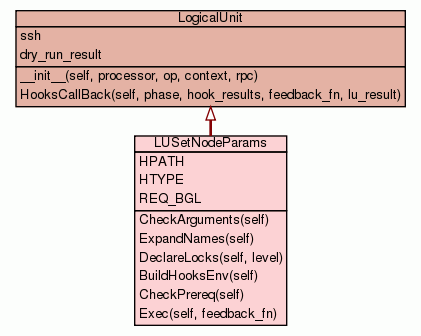
| Trees | Indices | Help |
|
|---|
|
|

Modifies the parameters of a node.
|
|||
|
|||
|
|||
|
|||
|
|||
|
|||
|
|||
|
Inherited from Inherited from Inherited from |
|||
|
|||
HPATH = "node-modify"
|
|||
HTYPE = "NODE"
|
|||
_OP_PARAMS = [_PNodeName, ("master_candidate", None, ht.TMaybea list of opcode attributes, their defaults values they should get if not already defined, and types they must match |
|||
REQ_BGL = False
|
|||
_F2R = {(True, False, False): _ROLE_CANDIDATE, (False, True, Fa dictionary from tuples of flags (mc, drained, offline) to the node role (as _ROLE_*) |
|||
_R2F = dict((v, k) for k, v in _F2R.items())a dictionary from node role to tuples of flags |
|||
_FLAGS = ["master_candidate", "drained", "offline"]a list of attribute names corresponding to the flags |
|||
|
Inherited from |
|||
|
|||
|
Inherited from |
|||
|
|||
|
Inherited from |
|||
|
|||
Check syntactic validity for the opcode arguments. This method is for doing a simple syntactic check and ensure validity of opcode parameters, without any cluster-related checks. While the same can be accomplished in ExpandNames and/or CheckPrereq, doing these separate is better because:
The function is allowed to change the self.op attribute so that later methods can no longer worry about missing parameters.
|
Expand names for this LU. This method is called before starting to execute the opcode, and it should update all the parameters of the opcode to their canonical form (e.g. a short node name must be fully expanded after this method has successfully completed). This way locking, hooks, logging, ecc. can work correctly. LUs which implement this method must also populate the self.needed_locks member, as a dict with lock levels as keys, and a list of needed lock names as values. Rules:
If you need to share locks (rather than acquire them exclusively) at one level you can modify self.share_locks, setting a true value (usually 1) for that level. By default locks are not shared. This function can also define a list of tasklets, which then will be executed in order instead of the usual LU-level CheckPrereq and Exec functions, if those are not defined by the LU. Examples:
# Acquire all nodes and one instance
self.needed_locks = {
locking.LEVEL_NODE: locking.ALL_SET,
locking.LEVEL_INSTANCE: ['instance1.example.com'],
}
# Acquire just two nodes
self.needed_locks = {
locking.LEVEL_NODE: ['node1.example.com', 'node2.example.com'],
}
# Acquire no locks
self.needed_locks = {} # No, you can't leave it to the default value None
|
Declare LU locking needs for a level While most LUs can just declare their locking needs at ExpandNames time, sometimes there's the need to calculate some locks after having acquired the ones before. This function is called just before acquiring locks at a particular level, but after acquiring the ones at lower levels, and permits such calculations. It can be used to modify self.needed_locks, and by default it does nothing. This function is only called if you have something already set in self.needed_locks for the level.
|
Build hooks env. This runs on the master node.
|
Check prerequisites. This only checks the instance list against the existing names.
|
Modifies a node.
|
|
|||
_OP_PARAMSa list of opcode attributes, their defaults values they should get if not already defined, and types they must match
|
_F2Ra dictionary from tuples of flags (mc, drained, offline) to the node role (as _ROLE_*)
|
| Trees | Indices | Help |
|
|---|
| Generated by Epydoc 3.0.1 on Mon Dec 20 13:26:46 2010 | http://epydoc.sourceforge.net |